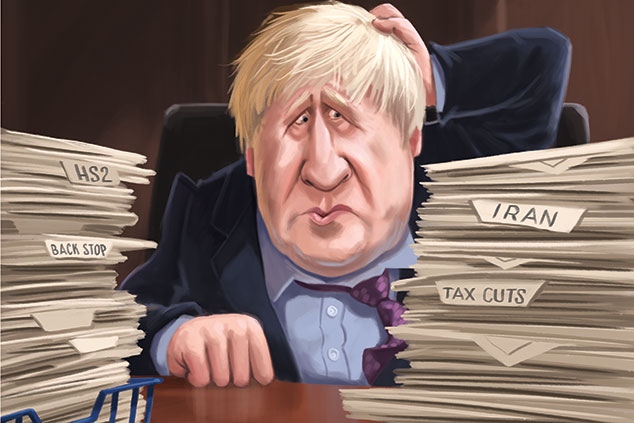What will Boris Johnson do in his first 100 days?
Boris Johnson, Britain’s new PM, has promised to cut taxes and boost spending. Is that likely? Matthew Partridge reports.

Get the latest financial news, insights and expert analysis from our award-winning MoneyWeek team, to help you understand what really matters when it comes to your finances.
You are now subscribed
Your newsletter sign-up was successful
Want to add more newsletters?

Boris Johnson has fulfilled a lifelong ambition and become prime minister, but he needs to bear in mind the fate of his predecessor if he wants to succeed, says The Daily Telegraph. Theresa May came into office with a "radical domestic agenda", but it "never saw the light of day" because of her inability to lead the country out of the European Union. Johnson must ensure that his "entire focus" is on "delivering Brexit by 31 October", the date at which the temporary extension to Article 50 expires, says the newspaper. With less than 100 days to go, this means all domestic policy planning "needs to be put aside" to prepare fully for a no-deal exit and "whatever disruption that might cause" (see below).
Healing a divided nationLeaving the EU will be the easy part, says Philip Aldrick inThe Times. The bigger taskwill be "healing our divided nation". Johnson's breezy optimism will only take us so far if he is to achieve that. He will have, for example, to choose between cutting taxes and red tape, and raising spendingto regenerate the regions.
Yet faced with a choice between increased spending and lower taxes, Johnson seems to want to have his cake and eat it, says Richard Vize in The Guardian. During the leadership campaign he "pledged more bobbies on the beat, a budget boost for schools" and even "hinted at public-sector pay rises". But at the same time he has promised to "raise the threshold for paying the higher rate of income tax [from £50,000 to £80,000] and cut corporation tax and business rates". The Institute of Fiscal Studies says that his planned increase in the threshold of the higher rate of income tax alone will cost £9bn.
Try 6 free issues of MoneyWeek today
Get unparalleled financial insight, analysis and expert opinion you can profit from.

Sign up to Money Morning
Don't miss the latest investment and personal finances news, market analysis, plus money-saving tips with our free twice-daily newsletter
Don't miss the latest investment and personal finances news, market analysis, plus money-saving tips with our free twice-daily newsletter
Don't take Boris too literally, says David Smith in The Sunday Times. The total cost of his pledges has been estimated at £20bn, but past experience suggests that "many of his most expensive ideas will be either quietly forgotten or put in the filing cabinet marked long-term ambitions'". Even if they are not immediately dropped, the fact that most of them don't come with a timeline means that their implementation "could be stretched out over many years". In any case, Philip Hammond's successor as chancellor will not want to preside over a "borrowing binge" that hits sterling and creates a crisis.
Headwinds will ruffle Boris
And if the UK economy runs into trouble, Johnson may not be able to rely on the Bank of England to bail him out, says James Kirkup in The Spectator. During the last recession, the Bank eased the austerity with "very loose monetary policy", which made it "easier and cheaper to get money". But in a recent speech, the Bank's chief economist, Andy Haldane, suggested that a Brexit shock would be different and would require changes to tax policy and structural reforms, which are the remit of the government not the bank. "It's possible I'm reading too much into [Haldane's] words," says Kirkup, but it seems that the Bank is signalling that Johnson "cannot rely on the Bank to cushion the blow of a bad Brexit". Expect "Boris and the Bank" to be a key theme in the months ahead.
A new plan for delivering Brexit
If Johnson expects the EU to "blink", by making major concessions, he should think again, says Charles Grant in The Guardian. EU officials believe they "can take no deal on the chin", having passed laws to protect their interests in "road haulage, aviation and financial clearing houses", and hired extra border staff. At the same time, "many in the Irish Republic would rather lose some income than abandon the backstop and thus endanger the peace process by restoring a hard border with Northern Ireland". The best possible outcome is that the EU will agree to "put some lipstick on the pig" by tweaking the Withdrawal Agreement, or rewriting the political declaration.
That may be the best Johnson can hope for given the parliamentary arithmetic, agrees Jeremy Warner in The Sunday Telegraph. Europhile Tories "do not intend to make his life easy" and are likely to work hard to block a no-deal Brexit. The only alternatives left would then be a "back me or sack me" general election; ignoring Parliament (which would spark a "constitutional crisis"); or "running down the clock" and forcing Parliament to revoke Article 50 entirely. MPs would then be put on the spot and have to choose whether to "honour or dishonour the refer
Get the latest financial news, insights and expert analysis from our award-winning MoneyWeek team, to help you understand what really matters when it comes to your finances.

-
 Review: Pierre & Vacances – affordable luxury in iconic Flaine
Review: Pierre & Vacances – affordable luxury in iconic FlaineSnow-sure and steeped in rich architectural heritage, Flaine is a unique ski resort which offers something for all of the family.
-
 Could you get cheaper loans under ‘significant’ FCA credit proposals?
Could you get cheaper loans under ‘significant’ FCA credit proposals?The Financial Conduct Authority has launched a consultation which could lead to better access to credit for consumers and increase competition across the market, according to experts.